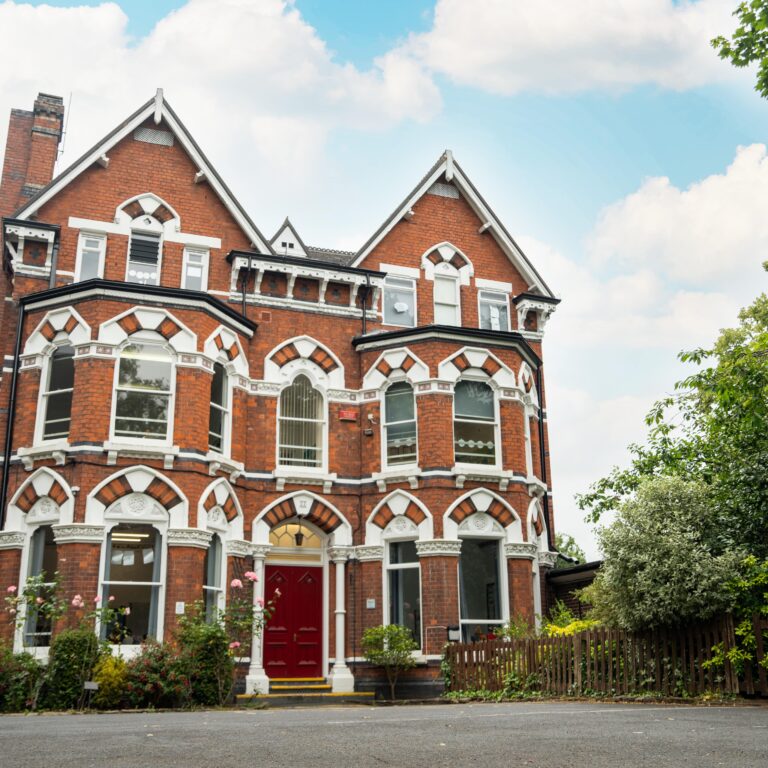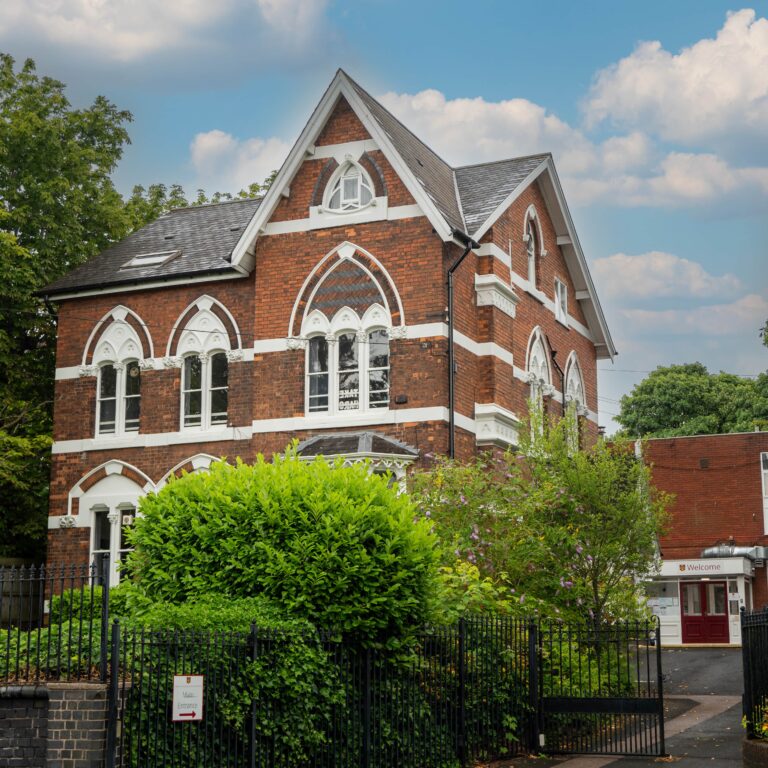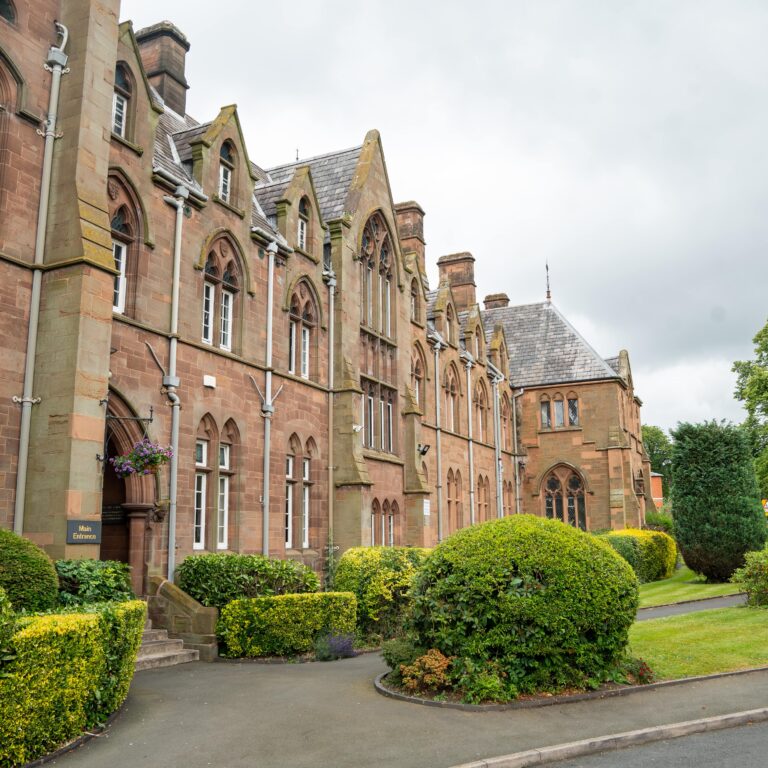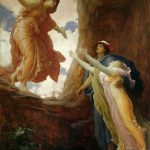Dear children and young people,
Well, (sob) it’s time to write my final memo in lockdown. I have really loved communicating with you all, but it is now time to start getting ready for school proper to start again in September. I promise I will keep up with my long walks in Sutton Park with dear Mr Moore and will do my best to maintain my 10,000+ steps a day in order to qualify for fish and chips Fridays!
I had the pleasure last week of conducting a virtual induction day for our new U3rds. It was such a shame not to have been able to welcome them properly and give them the lovely day that we normally provide. I’m sure many of you will remember how worried you were about starting ‘big school’ so it was a delight to be able to reassure these lovely new children and, thanks to Lorna and Matthew S, they went away feeling much more reassured and positive about life in secondary school. I was SO proud of Lorna and Matthew by the way, they wrote their own little speeches and delivered them so professionally – well done to you both (house points have been awarded!). The year 6 children asked some interesting questions, but Lorna and Matthew were brilliant and answered them all very well.
The children and young people at Highclare never fail to amaze me – you are always willing to help out at open days and events and agree to help me out when asked – even at very short notice! Isabel and David were similarly brilliant when they helped with our virtual open day last month – so don’t be surprised if I contact YOU one day!
The report tutorials delivered by your form teachers (U3-U4) on Monday were also very successful and I have been pleasantly surprised by how well most of you have responded to remote learning and how much you have enhanced your independent learning skills as a result. Well done again!
Yesterday, I had the pleasure of delivering a virtual assembly to our U5 pupils. It was heartening to see most of you there, U5, and I had a tear in my eye as I waved goodbye to you. I am of course looking forward to welcoming many of you back in September to begin your A level studies and it has been an absolute joy to note how well you all responded to the study skills sessions and A level transition units that we provided. I am really going to miss my very interesting conversations with Toby on Wuthering Heights and Jane Eyre and have been so very impressed with the comments from all your teachers about how well you have responded generally to the tasks they set you during this difficult time in your educational journey. Well done! I am really proud of you all and, as mentioned briefly in assembly this afternoon, Mrs DeSousa and I are working on the idea of organising the prom that you should have had – watch this space and keep those fingers crossed!
I’ve also really enjoyed seeing you all in assembly this morning (U3-U6) and hearing those cheers being raised by our Head Prefects, Katie and Elis. It was sad, however, to have to say goodbye to dear Mrs Healey, but we will keep in touch and I’ll be making sure that Mr Moore and I get up to see her over the holidays for a long walk in the Highlands!
The rain is rattling against the cloister windows as I write this and it seems like the warm days of summer will never come back. However, I have it on good authority that next week the sun will appear again and we will be able to enjoy days out in the parks or on the beaches again. I can only remember warm sunny days when I look back to my own childhood summers. In Northern Ireland, we used to break up in June and not go back until September, so the summers seemed endless. We didn’t go on any exotic holidays, but we did spend many a long summer with my lovely grandparents in Wales. It never rained when I was young (only kidding) and I can only remember long days on the beaches near our home in Ireland and on the Gower Coast where my grandparents lived.
As you know from my previous memos, I absolutely love being by the sea. I love the sea in summer and winter and can hardly wait to be near the coast again soon. Thinking of the sea reminds me of a parody of the poem I mentioned in one of my previous memos – Sea Fever by Masefield. This is the Spike Millington version:
I must go down to the seas again
To the lonely seas and the sky
I left my vest and socks there
I wonder if they’re dry?
When I think of the seasons and summer in particular, it reminds me of the myth of Demeter and her daughter Persephone and how the Ancient Greeks explained the changes of season.
According to Greek Mythology, Persephone, the queen of the underworld, was the daughter of Zeus and Demeter (the goddess of harvest and fertility). Persephone was beautiful and very precious to her mother, Demeter. However, Hades, the god of the underworld (or hell) was captivated by Persephone’s beauty and asked Demeter for her hand in marriage. Demeter turned him down as she didn’t want her beautiful daughter to live in the underworld with all its darkness and despair. Hades was heartbroken so one day when he saw Persephone picking flowers in the valley he made the earth beneath her feet open and he grabbed her and descended with her to his underworld kingdom.
Demeter was desperate to find her daughter but no one had witnessed her disappearance. However, the leader of the gods, Zeus (Persephone’s father and brother of Hades brother) witnessed the whole event. He decided to keep quiet rather than risk falling out with his brother.
A distraught and heartbroken Demeter wandered the earth looking for her daughter and eventually discovered that Hades had abducted Persephone and that her husband, Zeus, knew all about it. Upon hearing this, Demeter became furious and, to punish the gods, she decided to take indefinite leave from her duties as the goddess of the harvest and fertility, which had devastating consequences. The earth began to dry up, harvests failed, plants lost their fruitfulness, animals were dying for lack of food and famine spread to the whole earth, resulting in untold misery.
A great fight followed and Demeter threatened that she would never again make the earth fertile and everyone on Earth would die. To put an end to this quarrel, Zeus decided that Persephone would spend six months with her husband in Hades and six months with her mother on Olympus. This alternative pleased none of the two opponents; nevertheless, they had no other option but to accept it.
Therefore, the beautiful Persephone became the rightful wife of Hades and Underworld, her mother was sad and missed her dreadfully and, in the process, neglected her duties as goddess of the harvest and fertility. Because of this, the earth became barren. According to the ancient Greeks, these were the months of autumn and winter, when the land is not fertile and does not give crops. In the months when Persephone went to Olympus to live with her mother, Demeter would shine from happiness and the land would become fertile again and fruitful. These were the months of spring and summer. Therefore, this myth was created to explain the change of the seasons, the eternal cycle of the Nature’s death and rebirth.
Persephone being taken into the underworld
I think it’s a great story and I imagined when I first heard this story as a child, that the rain we get in autumn and winter is like the tears of Demeter as she cries and mourns for her beloved daughter.
Some poets, you might be pleased to hear, disliked school and thought that forcing children to go to school every day was like putting them in a cage. One such poet (another of my very favourites) was William Blake. Blake was a member of the Romantic school of poetry and many of his poems were based on the injustices that existed in England in his era. Poems like ‘London’ decried the poverty and sadness of the people who lived there, but two of my favourite poems by Blake are ‘The Schoolboy’ and ‘The Poison Tree’ (yes, I will add them below for you to read – think of this as your summer reading task!). In the Schoolboy, Blake likens the boy to a bird in cage and I love the way he uses the metaphors of nature to explore the effect of school upon a child’s development. Obviously, schools in Blake’s day were nowhere near as wonderful as Highclare – so don’t get any ideas!
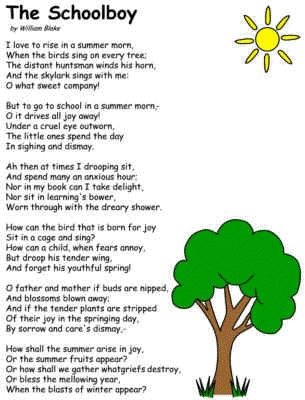
Blake also imagined how being unkind and cruel can lead to great sadness and in his poem, ‘The Poison Tree’, he again uses the metaphor of a tree (you know how I love trees) to explore the effect of holding grudges upon friendship. Blake’s message still rings true today, so please read and think about it.
Blake was also an artist and mystic – he apparently saw angels in a tree at the bottom of his garden when he was a little child and many of his paintings have angels in them as a result.
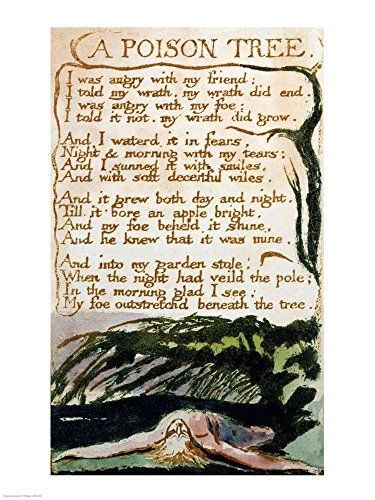
You may not be aware of this, but Blake also wrote the wonderful poem ‘Jerusalem’ – now a very famous and beautiful hymn – which is based on the legend that, as a boy, Jesus of Nazareth visited England with his great uncle, Joseph of Arimathea, who was a sailor and trader. The “feet” in the line “And did those feet in ancient time” refers to Jesus. The legend of Jesus walking upon England’s mountains green is part of the medieval legends about Britain’s own King Arthur. Those stories say that after Jesus’s Crucifixion, Joseph took the Holy Grail to Glastonbury, where he established the first English church. Interesting and fascinating – why not look into this myth and listen to the words of the beautiful hymn whilst doing so?
Anyway, before I leave poetry behind (yippee, I hear you cry), one of my other favourite poems (yes dear children, there are many of them) is by A E Houseman who wrote this beautiful, short poem about the Shropshire hills. However, it’s not really based on mere geography, it is more about a man (Houseman) looking back at the memories of days gone by when he was young and free of the worries that he was facing in middle age (I feel like this sometimes too btw!)
A Shropshire Lad
INTO my heart an air that kills
From yon far country blows:
What are those blue remembered hills,
What spires, what farms are those?
That is the land of lost content,
I see it shining plain,
The happy highways where I went
And cannot come again.
It is short and sweet, but, for me it really captures the sadness of longing for the past and knowing that you can never return to it.
Anyway, dear children and young people, I’ve rambled on far too long again so will need to close. I can only finish by thanking you all again for all your hard work, tenacity and strength during these long, dark days of lockdown. You have been amazing and I am so proud of you all. I hope that when school opens again in September, you will continue to learn from these experiences and continue to work hard and achieve the great things that you deserve to in the future.
Remember that this pandemic has taught us all how to be kind, how to help each other and how to become much more independent in our learning. It has also taught me how to Zoom and become much more technically astute and I am so grateful for that!
I am going camping tomorrow with some of the teachers in darkest Derbyshire and I am so looking forward to being out again in the wilds of nature (although not looking forward to the actual camping bit – I’ll miss my morning toast and warm bed!).
I hope you all have an absolutely wonderful summer break. Remember to stay safe and well and continue to be helpful around the house. Remember you are special, you are unique and you are loved. Be kind to others and to yourself and come back in September ready to get cracking again!

Love and very best wishes,
Mrs M
